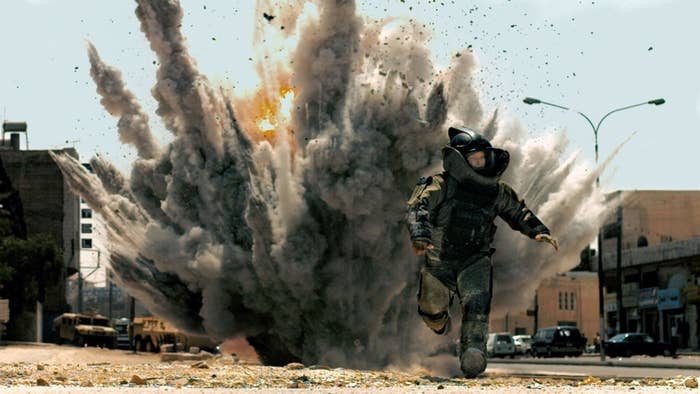
The 10th anniversary of the Iraq War has now been dutifully marked by most New York and Washington, D.C., news outlets, many of them even acknowledging their own horrible track records in misinforming the public about the conflict. Thankfully, we still have Hollywood to get the story right. The heart of the entertainment industry is currently one of the most influential spots in America when it comes to shaping our nation's historical memory, as the recent controversy over the accuracy of Zero Dark Thirty revealed. Most of us think television and film play a greater role than contemporaneous news accounts in shaping the public's view of the past.
At present, there have been approximately 102 major projects about the war — over 300 if shorter documentaries and television shows are included. Many have done an admirable job of capturing the conflict's disturbing consequences at home (Valley of Elah, Stop-Loss, Saving Grace) and the madness of the invasion (the HBO series Generation Kill, based on the book by Evan Wright); and other flicks have used Iraq as more or less a backdrop for action. The A-Team remake transplanted the original Vietnam setting to Iraq and delivered a killer performance from Bradley Cooper. The most successful Iraq movie to date, the Academy Award–winning The Hurt Locker skillfully managed to capture the soldier's genuine emotional experience of the war while giving the audience the adrenaline-rush feeling of combat. Not to mention a number of powerful documentaries that were not produced in Hollywood but found distribution within the studio system, like Uncovered: The Whole Truth About the Iraq War, Fahrenheit 9/11, and Ghosts of Abu Ghraib.
The catch, of course, is that conventional wisdom has declared Iraq films are "poison," says NYU professor Patrick Deer, author of the soon to be released Surge and Silence: Understanding America's Culture of War. "There's been a vicious circle in the sense that the critics have tended to reproduce the wisdom [of the studios] that feature films about the Iraq War are box-office poison. It's almost as if both the critics and the mainstream Hollywood studios have a view that somehow the Iraq War is always going to be a cinematic failure."
Explains Robert Greenwald, who has produced over 77 titles, including award-winning documentaries about the war: "The entertainment industry is focused on profitability, and therefore that is often at odds with the demands of telling certain stories. The common belief system is that hot-button subjects, people are not going to pay eight or nine, ten [dollars] to see movies about those subjects." Indeed, from a purely financial outlook, the results have been dire. But that fact makes it more impressive that Hollywood, which normally flees like the plague from subjects that fail to perform at the box office, continues down this path. Despite winning the Academy Award for Best Picture, Hurt Locker grossed a middling to poor, by Hollywood standards, $49 million worldwide. Valley of Elah did even worse.
There are, however, Greenwald notes, exceptions to the financial rules. And it's those exceptional films that break through that have the most impact on how we view the past. Vietnam, obviously, had its Deer Hunter, Apocalypse Now, Casualties of War, Hamburger Hill, and Platoon, a list of powerful films made in the 15 years following the war's end in 1975. Officially, the Iraq War ended in 2011, and unofficially, it's still going on. "What is that iconic Iraq War film going to be?" asks Meredith Lair, who teaches a course in Vietnam and film at George Mason University. "Whether that defining film about the Iraq War is going to be a celebration or a critique? [Or if it will be] a big action movie? Would it be something the Department of Defense would be involved in?" Lair notes we're "waiting for that film to come along."
Hollywood has the chance to deliver. Those iconic Vietnam films didn't show up until half a decade after the war ended, after all. IMDBPro lists six Iraq-themed big-budget projects going into production within the next three years, plus more documentaries. The most exciting include the Wachowski brothers' CN9, or Cobalt Neutral 9, about a homosexual American soldier falling in love with an Iraqi. And there are other projects approaching the themes of the war from science-fiction and fantasy angles, a tried-and-true means to make a powerful critique without ever having to mention the word "Baghdad." The science-fiction classic The Forever War, by Joe Haldeman, is in production for Fox 2000. That novel was the veteran Haldeman's response to the Vietnam War, and it's fitting that its eventual adaption will seem even more relevant today. Robert Altman's MASH, after all, the most powerful statement about Vietnam that Hollywood produced while the war was in progress, was, in fact, about the forgotten Korean War, used as a stand-in for the ongoing fighting in Saigon; the original Catch-22 was set in WWII, though it gave us a vocabulary to explain every war that we've had since. Perhaps the timing on this last batch will prove opportune, even though the conflict drags on in Iraq — still approximately seven or eight attacks a day.
"Iraq is a terrible, extraordinary tragedy that we as a country haven't even begun to deal with," says Greenwald, who was one of the first documentary filmmakers to criticize the war. "The size and scope, the number of people killed, the families destroyed. It's truly mind-boggling. You need Shakespeare or something to write about. That's not something we'll see traditional commercial films take on." Of course, there are exceptions, and it's on us to go watch them.
— Additional reporting by CJ Lotz
